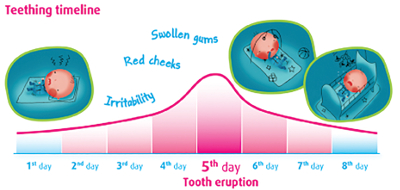
How to soothe baby’s sore gums
The teething process is not the same for every baby. For one baby, cutting a tooth can happen overnight, without pain or discomfort, while another child might have to endure a long, drawn out and painful experience. Unfortunately, a fussy teething baby leads to sleep deprivation and irritability for baby and parents.
All parents can agree that it can be tough to watch your little one suffer through this painful process, but there are things you can do to help. And a happy baby means happy parents.
The first step is to find out if your baby is really teething or if the discomfort is a sign of another problem. Here are the signs to look for:
- Crankiness/fussiness
- Restlessness/trouble sleeping
- Pulling at the ear/rubbing the face
- Swollen gums
- Biting or chewing on things
- Refusal to feed
- Excessive drool
- Diarrhea (loose stool)
Most babies go through an eight-day teething timeline where symptoms like red cheeks and swollen gums, drooling and trouble sleeping intensify from the first day, right up to the tooth eruption on the fifth day. Once the tooth erupts, the following days see a decrease in intensity of the symptoms until they slowly dissipate altogether … until the next tooth.
 Here are some home remedies that can help soothe your baby’s sore gums:
Here are some home remedies that can help soothe your baby’s sore gums:
- Use a clean finger, moistened gauze pad or damp washcloth to massage your baby’s gums. The pressure can work to ease the discomfort.
- Try a rubber liquid-filled teething ring to relieve baby’s need for chewing.
- Keeping the gums cool with a cold washcloth or chilled teething ring can be soothing. Also, if your baby’s eating solid foods, cold items such as applesauce or yogurt are good choices.
- Excessive drooling is par for the course for the teething process; help prevent skin irritation by keeping a clean cloth handy to dry your baby’s chin and opt for absorbent sheets for bedtime.



